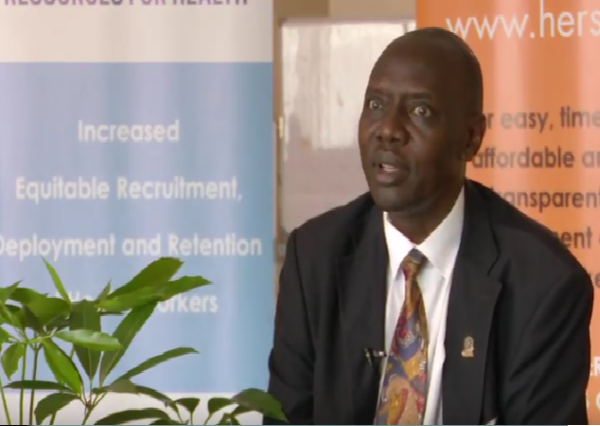The Health Service Commission launched an E-Recruitment system for health workers. A streamlined system, the E-Recruitment will help those hoping to join the Public Service to apply for placement in the health sector online. A 2015 report on human resources for health showed that Uganda had a total of 5,418 public and private not for profit health facilities requiring over 60,000 health workers. The same report indicated that the country was short of about 20,000 health workers. The approved staffing norms at the local government level were 50,960 well as the National level stood at 59,232. The number of filled vacancies stood at 34,260 for the local government and 40,790 nationally, 16,700 at the local government were still vacant and 18,442 nationally.
The same report showed this significantly affected the operations of available health workers due to the surging number of the patients. The Chairperson of the Commission, Prof. Pius Okong said that these vacancies were filled according to their annual budgets as a portion by the Ministry. “It is probably spending more than 400 million to carry out the recruitment exercise and when numbers go up like suddenly have to do validation then it’s in the excess of 500 million.” The health sector saw a budget fall from 1 trillion shillings in 2016/2017 to 964 billion this Financial Year. But Prof. Okong said a number of health facilities already had their recruitment budgets financed. “So, but now, they have to clean up where there are some redundancies. Number two; to clean up when some of the workers who were appointed not long ago to report because there was a delay in the appointment of these people, I mean giving them appointment letters and deploying them.” Said, Prof. Pius Okong – Chairperson, Health Service Commission.
He however, said that some qualified and experienced people didn’t prefer working with the government. “So, there are very many people who have undergone further training to get degrees or diplomas and postgraduate training by getting sponsors or paying for themselves. So once they complain, they may not be too eager to work for the government. So but you will see the graduation, they are there. And also the terms and conditions of service may not prevail to attract them.” This year, the Ministry of Health only availed about 700 vacancies to be filled. One would wonder why it was not filling up the positions yet Uganda ranked high in producing medical students. It was estimated that about 320 students graduate in medicine each year. “Because the advertisement was very expensive, the other problem they had was that the District Service Commissions did not have money to sit, to shortlist, interview and so on. Because this would require a lot of time if they had thousands of applicants going through the papers.” Said, Dr. Vicent Oketcho – Chief of Party, SHRH Project.
Prof. Okong said there were many training schools that had littered the market with a large number of health cadres with similar qualifications leaving out the others. “The government has limited number of vacancies to take these people on board and you know you can take more by changing how many are required in each facility. That is an implication on money for paying salaries which at the present the government has not adjusted. There are other groups where the numbers produced is small, so even if you produce five, ten or fifteen you never fail on the vacancies.”
The budgetary cuts also had a toll on the recruitment process. “Even if the vacancies are there, the workers are there and they want to work, sometimes the institutions do not have a wage.” According to the 2015 report on health, the government adopted some recommendations including having engagements with line Ministries like Finance and Public Service on how best to address the human resource challenges.

